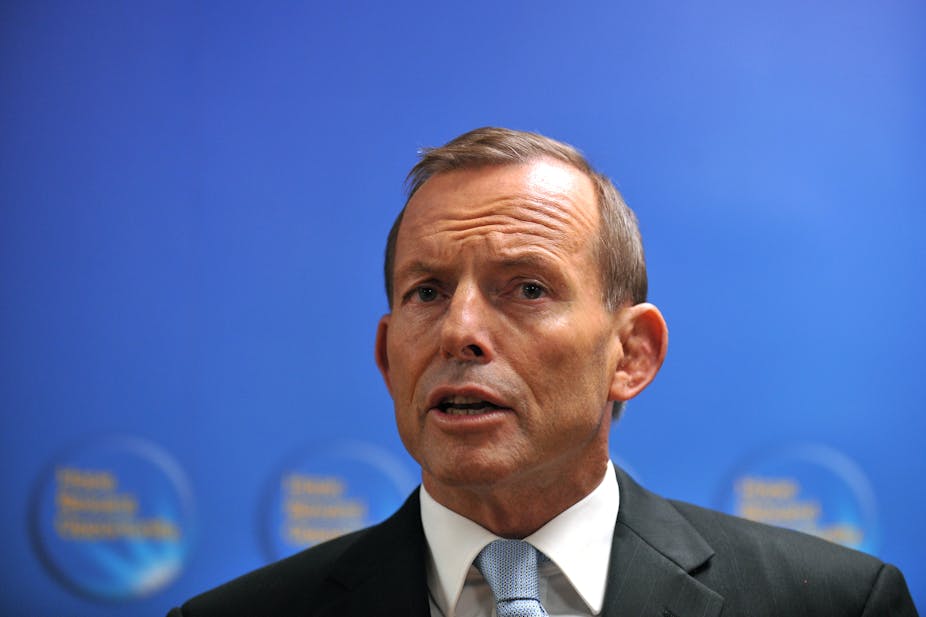Unions’ power would be curbed under an Abbott government, with more restrictions put on their right of entry to workplaces and a time limit imposed for concluding “greenfield agreements” for new projects.
Opposition leader Tony Abbott has released a politically highly cautious industrial relations policy that promises to “retain and improve the Fair Work Act”.
“The only people with anything to worry about from this policy are dodgy union officials and their supporters,” Abbott said.
While the policy does not seek to alter sensitive provisions such as the unfair dismissal law and would not bring back statutory individual contracts, it would limit the scope of union activities.
The Coalition would remove the ability to restrict the use of the present individual flexibility arrangements in enterprise agreements.
“Many unions do not like individual workers and their employers agreeing on employment conditions that are different from anyone else,” the policy says. “To appease union interests Labor ensured that the Fair Work laws allow enterprise agreements to restrict the use of IFAs.”
“The ability for an IFA to be restricted by the terms of an enterprise agreement will be abolished.”
The policy says that the Fair Work laws effectively give unions power of veto over new projects by requiring an employer to always negotiate a greenfield agreement with a union - and some unions have exploited this with delays and setbacks and others have used it to demand exorbitant conditions.
A Coalition government would require negotiations for new project agreements to be finished within three months. If this time limit was not met, the Fair Work Commission could make and approve the agreement.
An Abbott government would “ensure union right of entry provisions are sensible and fair,” the policy says, adding that it would take them back to the model Julia Gillard promised as spokeswoman in 2007.
“While it is important to allow workers access to industrial representation, the current rules have been abused and exploited by some unions. This is unfair to workers and businesses that simply want to get on with their jobs, rather than dealing with unreasonable attempts by unions to access their workplace.”
Abbott anticipated that the unions would “scream the house down” but emphasised his moderate credentials on industrial relations. He said he had been a successful minister for workplace relations in the previous government and had listened carefully to all sides of industrial discussions.
“Famously I was one of the few ministers around the cabinet table who had some significant reservations about the former government’s 2005 workplace relations changes,” Abbott said.
“There won’t be another WorkChoices - it is dead, buried and cremated. The past is the past and we will not go back to it,”
He had been a union member himself, and when he was a journalist in the late 1980s had actually moved a movement to go on strike on one occasion.
“So I understand unions. I respect well run unions. I understand and respect unionists, but I also understand and respect the 87% of [private sector] workers in this country who choose not to be members of unions.
"We need a workplace relations system for everyone and that’s what the Coalition intends to deliver,” he said.
According to 2012 Australian Bureau of Statistics figures, 18% of all workers were union members in their main jobs in 2011, with 13% of private sector workers belonging to a union. The proportion of public sector workers belonging to a union in 2011 was 43%.
A Coalition government would have the Productivity Commission inquire into the industrial relations system. Recommended changes which were supported by the Coalition would be taken to the following election.
The policy goes out of its way to stress that a first-term Coalition government would not introduce changes that had not been foreshadowed.
Abbott said the Coalition would reemphasise the importance of productivity in enterprise bargaining. It would ensure that in order to have protected industrial action, the parties would have to have been “talking first and striking later.”
He said the heart of the policy was ensuring that the “rule of law operates in our workplaces and that unions and industrial organisations are run honestly and in the interests of their members.”
The Coalition would reestablish the Australian Building and Construction Commission, which will please business. The rule of law mattered particularly in vital industries such as construction, “I think all Australians were appalled by the scenes in Melbourne a couple of months ago, there were violent protests, including attacks on police and police horses.”
And a registered organisations commission would be established to ensure high standards in governance of unions and other industrial organisations. “There has been example after example of rorts, rackets and even corruption inside some important unions,” Abbott said.
The Coalition is aiming at the creation of one million new jobs and two million within 10 years.
The Business Council of Australia said the proposed changes went some of the way to address issues in the current Fair Work act, they did not address all of them. The proposed Productivity Commission Inquiry would provide opportunity to look at the others and look at recommendations.
The Greens attacked the policy and called on Labor to guarantee it will join with the Greens in blocking proposals if they came before parliament.
Workplace Relations Minister Bill Shorten said the policy should send “a shiver up the spine” of workers. It would make it easier for workers to be signed up to individual workplace contracts.

